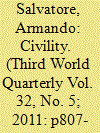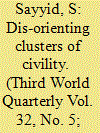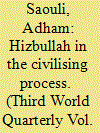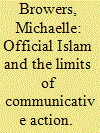|
|
|
Sort Order |
|
|
|
Items / Page
|
|
|
|
|
|
|
| Srl | Item |
| 1 |
ID:
106659


|
|
|
|
|
| Publication |
2011.
|
| Summary/Abstract |
This study examines how Arab states have constructed national regulatory regimes for satellite television and telecommunications which undermine or inhibit the emergence of the three normative requisites for a civil political culture: freedom, equality and tolerance. Drawing on case studies of Jordan, Egypt and the UAE, the study argues that, by failing to be either self-limiting or to protect civil society from its uncivil components in the new communicative spaces provided by these technologies, the Arab states are attempting to reconstruct their own dominant (new) media spaces and so prevent the conditions which might foster democratic political cultures of civility.
|
|
|
|
|
|
|
|
|
|
|
|
|
|
|
|
| 2 |
ID:
106653


|
|
|
|
|
| Publication |
2011.
|
| Summary/Abstract |
This contribution explores how authoritarian governmental practices come to inform everyday civilities-manners and forms of interaction among the subjects of government. With a focus on Egypt it examines how forms of government and rule deployed by the state give rise to particular modes of action, norms of interaction and socio-political dispositions among the citizenry. Central to this analysis is the examination of political subjectivities that develop in regular encounters with the agents and agencies of the state. These subjectivities generate understandings of self in relation to the apparatuses of power-out of intimate knowledge of their workings and of the multiple orders at which they operate. Integral to citizen subjectivities are civilities cultivated in interaction with the state and with fellow subject-citizens.
|
|
|
|
|
|
|
|
|
|
|
|
|
|
|
|
| 3 |
ID:
106651


|
|
|
|
|
| Publication |
2011.
|
| Summary/Abstract |
This study explores the question of if and how associative bonds based on violence, control and self-restraint mediated by contractual relationships become institutionalised within societies and discusses the cultural factors that determine this threshold. It investigates the trade-off between formalised forms of interaction that safeguard individual rights and secure state control, and less formal modes of civility that deepen trans-state interconnectedness. It asks whether civility is the result of a global civilising process in the sense highlighted by Norbert Elias, whereby affect control is matched by formal norms guaranteed by legitimate institutions, or whether it is rather the much more complex constellation of specific actualisations of the more general trade-off as just defined. After summarising the current twists of the meaning of civility against the background of liberal and modernist precedents and delineating the alternative patterns of civility within Islamic, especially modern Ottoman, history, the analysis critically interrogates Weber's notion of Verbrüderung as the pre-modern root concept of organised forms of common action, mutual solidarity and civic participation. Finally, it questions whether this idea fits the historic forms of association in the Islamic world, in particular the privileging of a lower threshold of institutionalisation of the associational bond than has traditionally been found in the European experience-and which survives in the current anxieties about resurgent mahalle (neighbourhood) informal governance in the AKP's Turkey.
|
|
|
|
|
|
|
|
|
|
|
|
|
|
|
|
| 4 |
ID:
106660


|
|
|
|
|
| Publication |
2011.
|
| Summary/Abstract |
Into what kind of narrative can we fit the recent eruption of the so-called `Arab street' into the public square? It is easy to argue that the reason why we are not certain what the story of the `Arab spring' is, is because it is too early to tell, and there is a degree of merit in this position; however, this simply defers rather than addresses the question. The problem with the recent popular mobilisations that swept many parts of Muslimistan is not purely empirical but rather conceptual. To tell a story presumes a language. Language is not itself a transparent medium, it does not just describe a pre-existing reality, it is also constitutive: it organises concepts, establishes relationships and networks, associations and dis-associations. The language that we use to apprehend the world around us is the residue of struggles of previous times; our vocabularies are crystallisations of specific historical confrontations and settlements. If our discourse (that is, both linguistic and extra-linguistic signifying practices) comes about as result of sedimented remains of historical struggles, then how can our discourse apprehend a world in which those historical forces are no longer in play?
|
|
|
|
|
|
|
|
|
|
|
|
|
|
|
|
| 5 |
ID:
106656


|
|
|
|
|
| Publication |
2011.
|
| Summary/Abstract |
This study argues that the perception of a state crisis has contributed to the rise of extreme right-wing civil groups in Turkey. It uses Michael Mann's work on interwar European fascism to identify four aspects-economic, military, political and ideological-in which the state has, according to these organisations, been weakened. The study thus outlines the ways in which Turkey's extreme right has both used and been affected by the 2001 financial crash, the armed forces' response to the pkk's ceasefire (1999-2004), the constitutional changes brought about by the EU harmonisation reforms and the incumbent government's challenge to 'official' religiosity and secularism.
|
|
|
|
|
|
|
|
|
|
|
|
|
|
|
|
| 6 |
ID:
106652


|
|
|
|
|
| Publication |
2011.
|
| Summary/Abstract |
The notion of civility, although commonly invoked in narratives about the Middle East and the Muslim world, fails nonetheless to be adequately framed and investigated in analyses of political change in the region. This contribution confronts this problem by considering, first, how far traditional 'Western' notions of civility are relevant to analyses of civility in polities where liberal normativity is not for the most part shared by those individuals and communities involved in everyday civic interactions. It then distinguishes the role that civility is commonly said to play in civil society and, via civil society inthe state-sanctioned framework for a 'good' society, from the relevance of civility for society itself. From this perspective the contribution emphasises the importance ofintersubjectivity in the communication of practices of civility, and de-emphasises the primacy of formal liberal norms and values for the recognition of the 'other' and the articulation of peaceful societal interactions.
|
|
|
|
|
|
|
|
|
|
|
|
|
|
|
|
| 7 |
ID:
106657


|
|
|
|
|
| Publication |
2011.
|
| Summary/Abstract |
This study builds on Norbert Elias's 'civilising process' theory to examine when, how and why Lebanon's Hizbullah exercises self-restraint or violence in its political interactions. As opposed to studies that focus on how Hizbullah's ideological goals determine its political behaviour, this study argues that Hizbullah's political conduct should be understood by locating the Islamic party at the crossroads of war-making with Israel and state-making in Lebanon. Hizbullah's aim to minimise its vulnerability to Israel led it to rationalise its behaviour in Lebanon by exercising self-restraint and by remoulding its ideology. However, as the political divide in Lebanon has sharpened and the state there weakened, Hizbullah has advanced to fill the void by employing state-like measures, including violence.
|
|
|
|
|
|
|
|
|
|
|
|
|
|
|
|
| 8 |
ID:
106658


|
|
|
|
|
| Publication |
2011.
|
| Summary/Abstract |
After 11 September 2001 many analysts, declaring a 'crisis of authority' in Islam, bemoaned the dearth or absence of Islamic moderates who could rise up and lead the way beyond what many worried was an impending 'clash of civilisations'. The 2004 'Amman Message'-which seeks to clarify who and what does and does not constitute 'true Islam'-was put forth precisely as a response to that challenge. At the same time critical examination of the construction of this declaration, and of the uses to which it has been put, reveals that, as much as this document may seem to provide an example of communicative action, in practice it has all too often served strategic actions. I argue that the embeddedness of the Message in domestic, regional and international political interests undermines the document's authority as the basis for dialogue or action aimed at civility and mutual understanding.
|
|
|
|
|
|
|
|
|
|
|
|
|
|
|
|
| 9 |
ID:
106655


|
|
|
|
|
| Publication |
2011.
|
| Summary/Abstract |
Departing from the idea that the externalisation of the EU's immigration policy has been tacitly accepted and even incorporated in the legal corpus of nations around the Mediterranean basin, this study argues that the southern European boundary has been redrawn, and gradually dislocated southwards to establish a new de facto border in northern and western Africa. The study adopts a comparative analysis evaluating the social effects of this novel geopolitical dynamic in two of Europe's closest neighbours, Morocco and the Cape Verde Islands, and focuses on the quasi-involuntary development of a new migration paradigm in both countries, based on an informal incorporation nexus. This important change in local socio-political contexts primarily derives from a steady inflow of sub-Saharan migrants, and the challenges they pose to civility in two nations where civil society is only nascent. As passage to Europe becomes increasingly difficult, many migrants are transforming what were until recently two eminent migration source countries into 'transit countries', increasingly becoming hosts to permanent states of transience and liminality. Current legal categories used to identify these new migration flows, and the lack of adequate asylum discourses, are also problematised. The study further explores the nexus of inclusion and exclusion, and formal and informal modes of incorporation, of the 'African other'.
|
|
|
|
|
|
|
|
|
|
|
|
|
|
|
|
| 10 |
ID:
106654


|
|
|
|
|
| Publication |
2011.
|
| Summary/Abstract |
This study will examine the Jama'a Islamiyya (ji) as an example of a group that has, in different ways, tried to shape patterns of civility and position itself as an interface between state and society in Egypt. It charts and offers an explanation for the ji's intellectual and programmatic transition fromaspiring to create a totally new polity based on a Salafi Islamic form of civility to an accommodation with the state and apparently more tolerant posture vis-à-vis society. The study analyses the ji's shifting interpretation of hisba and argues that, although the ji appears reconciled to a more co-operative stance, the group continues to promote an unrealistic vision of state-society relations in Egypt. Whereas before the 'revisions' the ji proceeded from an idealised conception of the Islamic state and the potential for its realisation in Egypt, its new ideas suggest an equally naive conception of the existing state and its ability to regulate, and police, society. The political and intellectual trajectory of the ji tells us much about the role of societal groups in sustaining authoritarianism in Egypt and suggests that any compact between the ji and a regime like that of Mubarak is likely to remain 'uncivil'.
|
|
|
|
|
|
|
|
|
|
|
|
|
|
|
|
|
|
|
|
|